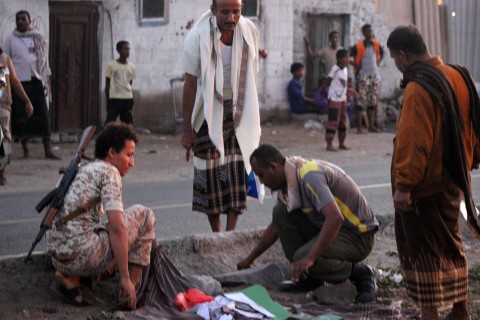
SANAA, Yemen – A suicide bomber detonated his explosives inside a military base in the southern city of Aden on Saturday, killing at least 48 soldiers and injuring dozens more, Yemeni officials said. It was the latest assault on forces loyal to an American-backed, Saudi-led military campaign to restore Yemen’s exiled government back to power.
The assault unfolded shortly after 4 p.m. as soldiers waited at the gate of the Solaban military base to collect their salaries in the port city, witnesses said. They had not been paid since September.
“A suicidal bomber sneaked in among the soldiers who were standing in line and blew himself up,” Mansour Saleh, a local journalist, said in a telephone interview. “This is not the first time this base was attacked.”
The bombing came days after Yemen’s internationally recognized President Abed Rabbo Mansour Hadi returned to Aden after spending months outside Yemen, mostly in Saudi Arabia. The soldiers were mostly from Brigade 111 based in neighboring Abyan province. The base was one of the biggest in the city.
The Health Ministry said the bombing killed 48 soldiers and 36 were reported wounded, but the number of fatalities could still rise, officials said.
No group has claimed responsibility for the bombing, but suspicion immediately fell on al-Qaida’s powerful Yemen branch as well as the Islamic State. Both groups are widely believed to have cells inside Aden and have claimed to have staged previous attacks on soldiers and officials in Aden, including one targeting Solaban a few months ago, which killed more than a dozen people.
In August, the Islamic State claimed responsibility for a suicide bombing in a mustering area for army recruits, killing at least 54 people, one of the worst suicide attacks to strike the country. In May, suicide bombers in Aden killed at least 45 army recruits lined up to enlist.
The conflict pits Hadi’s forces against an alliance of northern rebels known as the Houthis and loyalists of former president Ali Abdullah Saleh. Shortly after the Houthis seized the capital, Sanaa, in early 2015, Hadi fled and eventually based his government in Aden. A regional coalition led by Saudi Arabia, and supported by Washington, intervened in the conflict but has so far failed to push the rebels from the capital despite a steady barrage of airstrikes.
The Sunni Muslim kingdom and its partners are wary of the Shiite Houthis and their suspected ties to Iran’s theocracy, which is widely believed to be backing the rebels.
The conflict has worsened a humanitarian crisis afflicting the country, the Middle East’s poorest. The United Nations estimates that at least 10,000 people have been killed in the conflict, many of them civilians.
(c) 2016, The Washington Post · Ali al-Mujahed, Sudarsan Raghavan
Image: Washington Post

